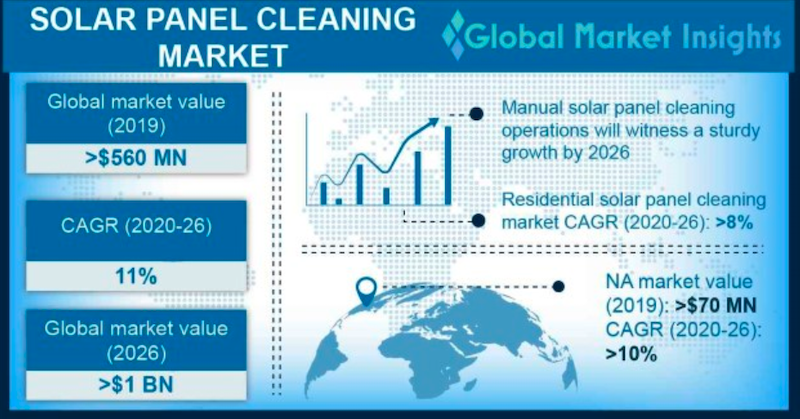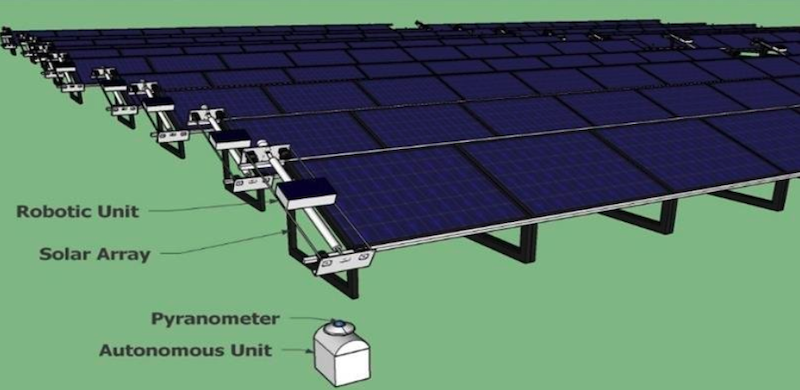The Future of Solar Panel Cleaning: Robots vs Humans
One of the advantages of solar systems is their minimal maintenance.
This is true, there are no moving parts in the panels that can fail due to friction, they do not wear out, so they can serve for a long time without loss of efficiency.
But often users notice that performance has started to drop. Some even call specialists, believing that something is wrong with the batteries. There’s something wrong with them, they are just dirty.
Solar systems need constant care. It is necessary to clean the surface of the panels at least 2 times a year – in spring and autumn, but it is better to do this more often.
We will look at how solar panels are cleaned today in homes and solar farms, who does it better, a human or a robotic solar panel cleaner, and consider the prospects for maintenance of solar farms in the future.

How to Choose a Solar Panel Cleaning Method: Manual or Automated?
First, let’s talk about how solar panels are cleaned. The principle of washing them is very similar to washing windows in houses.
You need water, a brush, a special chemical solution, and someone who will manage all this inventory and wash the panel. It can be a person, a robot, or an automated system. First, you need to choose who exactly will wash the panels.
If this is a household station on the roof of the house, the owner may think that there is nothing difficult in cleaning it. When an inexperienced person climbs with soapy water onto a roof with a slope, this can end badly.
Unfortunately, accidents have happened more than once. Therefore, we will not consider solar panels self-cleaning in this article. We will talk about specialists from technical services, large automatic systems, and universal robots.
When choosing a cleaning system, you should pay attention to the following criteria:
- Where is the solar system located (roof of the house, garage, ground)?
- How big is a solar station?
- Is there direct access to water?
- Fuel cost
- Salaries of solar panel cleaning operators
- Financial opportunities
Each of these factors is important when choosing a cleaning method. Your country may have expensive fuel and cheap labor, or vice versa.
Then in the first case, you need to choose manual labor, and in the second, automated cleaning. The same is true for all other criteria. Consider each solar cleaning system and conclude.
Manual Cleaning of Solar Panels
We have already said that you can wash the panels manually with water, a washcloth, and a special liquid. If we are talking about a home station and panels that are located horizontally on the roof, then the process does not take much time and does not require significant effort.
But even in this case, there are problems. If the panels are placed on the slope of the roof at a large angle, then the process of cleaning them becomes really difficult.
Consider what can happen to the panel washer:
- Falling from height
- Electric shock
- Poisoning with aggressive chemicals
- Sunstroke or overheating
Above we are talking about panels that are located on a private house roof. And what about solar stations on skyscrapers, with hectares of panels on solar farms? To care for them, you need an army of professionals, a huge amount of water, and detergents.
But there are advantages to manual cleaning. It suits small firms where rows of panels are too close together to save space. The automatic installation, which is in use on a large farm, will not pass here.
You have to use manual labor or as an alternative to a solar cleaning robot, which is also not always convenient. But we will talk more about this later.
It is worth automating the washing of the panels of a home installation, a controversial issue, and also expensive. The best solution would be to use manual labor. Do not wash the panels yourself, but find solar companies nearby that have a panel washing service.

Automated Cleaning Systems
These are massive devices that are in use on large solar farms. On the one hand, they are convenient in terms of performance and speed, on the other hand, they also have their drawbacks. They need a lot of space to pass between the rows, and this reduces the number of panels that are placed in the usable area.
An automatic solar panel cleaning system requires constant replenishment of water and detergent in large volumes, so it needs to be organized. If the area is large, water needs to be brought in tanks, and this is an additional cost for fuel, driver work, and so on.
In addition, such systems are expensive, and they are in use quite rarely, since in places remote from highways and housing, where farms are usually located, the panels can only become dusty or dirty with birds.
With such an installation it is impossible to wash one or two dirty panels or even a dozen, but selectively from different rows.
What is the way out of the situation, what to do if manual labor is long, expensive, and unsafe, and automatic systems, although fast, are also expensive and not always convenient?
Solar Panel Cleaning Robot
This is a modern solution for both private solar stations and large farms. The autonomous compact robot is mobile and can be programmed for different cleaning modes. It works quickly and accurately, and moves along the surfaces of the panels on its own, without damaging the top layer.
The weight of the cleaning robot allows one person to pick it up and move it to the desired location. With such assistants, you can clean the panels in whole rows or selectively without much effort and time.
But this miracle of technology has its drawbacks:
- It is necessary to organize a continuous water supply: If the robot has a tank that is too voluminous, it will become too heavy and the panels may simply not support its weight.
- A battery powers the robot: On cold nights, it can be discharged too quickly.
- Cleaning robots are an expensive pleasure: One robot cannot cope with the volume of even a small farm. For large areas, it is recommended to purchase several pieces of equipment that will be equal to the number of rows on the farm.
At the moment, many companies buy cleaning robots for their farms as well as companies installers and service providers for their customers. So what will happen to the solar panel cleaning system in the future?
Important Issue
It is impossible to say unequivocally that there will be no manual cleaning of solar panels in the future. But it is difficult to argue with the fact that progress and comfort, speed, and safety are behind the robots.
Hundreds of solar maintenance companies are already acquiring automated assistants that are easy to operate, neat, and economical.
Solar panel maintenance is an important issue that many companies and research institutes are working on. Today, new technologies are being developed: waterless cleaning, and vibration cleaning without human intervention.
So far, all technologies are at the development stage and it is clear that sooner or later something will come to replace humans and robots. But in the foreseeable future, it is the robot that we see as the most promising and fastest way to clean solar panels in any quantity.

